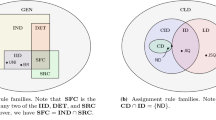Abstract
We investigate the benefit of priority shifting for resource allocation in systems with a shared resource, where higher priority implies better service. Priority schemes where priority levels are assigned fixed shares of the resource experience underutilisation if there are only low-priority tasks present. In these situations, lower priority tasks can be ‘shifted up’ to higher priority. This increases overall system utilisation and improves the service experienced by low-priority tasks. We present a shifting framework, study its properties and develop a Petri net model for a shifting algorithm. We analyse the model in order to identify situations where shifting of priorities is beneficial.
Preview
Unable to display preview. Download preview PDF.
Similar content being viewed by others
References
Kopetz, H.: Real-Time Systems Design Principles for Distributed Embedded Applications. Springer, Heidelberg (1997)
Bhatia, R., Segall, A., Zussman, G.: Analysis of Bandwidth Allocation Algorithms for Wireless Personal Area Networks. ACM/Springer Wireless Networks (WINET) 12(5), 589–603 (2006)
Terré, M., Vivier, E., Fino, B.: Optimisation of Downlink Resource Allocation Algorithms for UMTS Networks. EURASIP Journal on Wireless Communication and Networking 5(4), 573–578 (2005)
IEEE 802.11 Working Group: Part 11: Wireless LAN Medium Access Control (MAC) and Physical Layer (PHY) specifications. Amendment 8: Medium Access Control (MAC) Quality of Service Enhancements (802.11e) (last seen June 6, 2008), http://www.ieee802.org/11/
Wolski, R., Brevik, J., Plank, J., Bryan, T.: Grid resource allocation and control using computational economies. In: Berman, F., Fox, G., Hey, T. (eds.) Grid Computing: Making the Global Infrastructure a Reality, pp. 747–772. Wiley and Sons, Chichester (2003)
Wolski, R., Obertelli, G., Allen, M., Nurmi, D., Brevik, J.: Predicting Grid Resource Performance On-line. In: Handbook of Innovative Computing: Models, Enabling Technologies, and Applications. Springer, Heidelberg (2005)
Zapotoczky, J., Wolter, K.: Increasing Performance of the 802.11e Protocol through Access Category Shifting. In: Proc. International Conference on Quantitative Evaluation of Systems (MMB 2008), Dortmund, Germany, pp. 195–204 (2008)
Zhao, Y., Tavares, C.: Network adaptive priority management in wireless local area networks, USPTO Application No. 20070258419, Palo Alto, CA, US (2007)
Szekli, R.: Stochastic Ordering and Dependence in Applied Probability. Springer, Heidelberg (1995)
IEEE 802.11 Working Group: Part 11: Wireless LAN Medium Access Control (MAC) and Physical Layer (PHY) specifications (last seen June 6, 2008), http://www.ieee802.org/11/
Iera, A., Ruggeri, G., Tripodi, D.: Providing Throughput Guarantees in 802.11e WLAN Through a Dynamic Priority Assignment Mechanism. Wireless Personal Communications 34, 109–125 (2005)
Ge, Y., Hou, J.C., Choi, S.: An analytic study of tuning systems parameters in IEEE 802.11e enhanced distributed channel access. Comput. Netw. 51(8), 1955–1980 (2007)
Zimmermann, A., German, R., Freiheit, J., Hommel, G.: Petri Net Modelling and Performability Evaluation with TimeNET 3.0. In: Haverkort, B.R., Bohnenkamp, H.C., Smith, C.U. (eds.) TOOLS 2000. LNCS, vol. 1786, pp. 188–202. Springer, Heidelberg (2000)
Various authors: The Network Simulator ns-2 (last seen June 6, 2008), http://www.isi.edu/nsnam/ns/
Janert, P.: Gnuplot in Action: Understanding Data with Graphs. Manning Publications (2008) ISBN 978-1933988399
Author information
Authors and Affiliations
Editor information
Rights and permissions
Copyright information
© 2008 Springer-Verlag Berlin Heidelberg
About this paper
Cite this paper
Reinecke, P., Wolter, K., Zapotoczky, J. (2008). Performance Analysis of Dynamic Priority Shifting. In: Thomas, N., Juiz, C. (eds) Computer Performance Engineering. EPEW 2008. Lecture Notes in Computer Science, vol 5261. Springer, Berlin, Heidelberg. https://doi.org/10.1007/978-3-540-87412-6_14
Download citation
DOI: https://doi.org/10.1007/978-3-540-87412-6_14
Publisher Name: Springer, Berlin, Heidelberg
Print ISBN: 978-3-540-87411-9
Online ISBN: 978-3-540-87412-6
eBook Packages: Computer ScienceComputer Science (R0)




